Intel Core i7-9700K 9th Gen CPU Review: Eight Cores And No Hyper-Threading
Why you can trust Tom's Hardware
Rendering

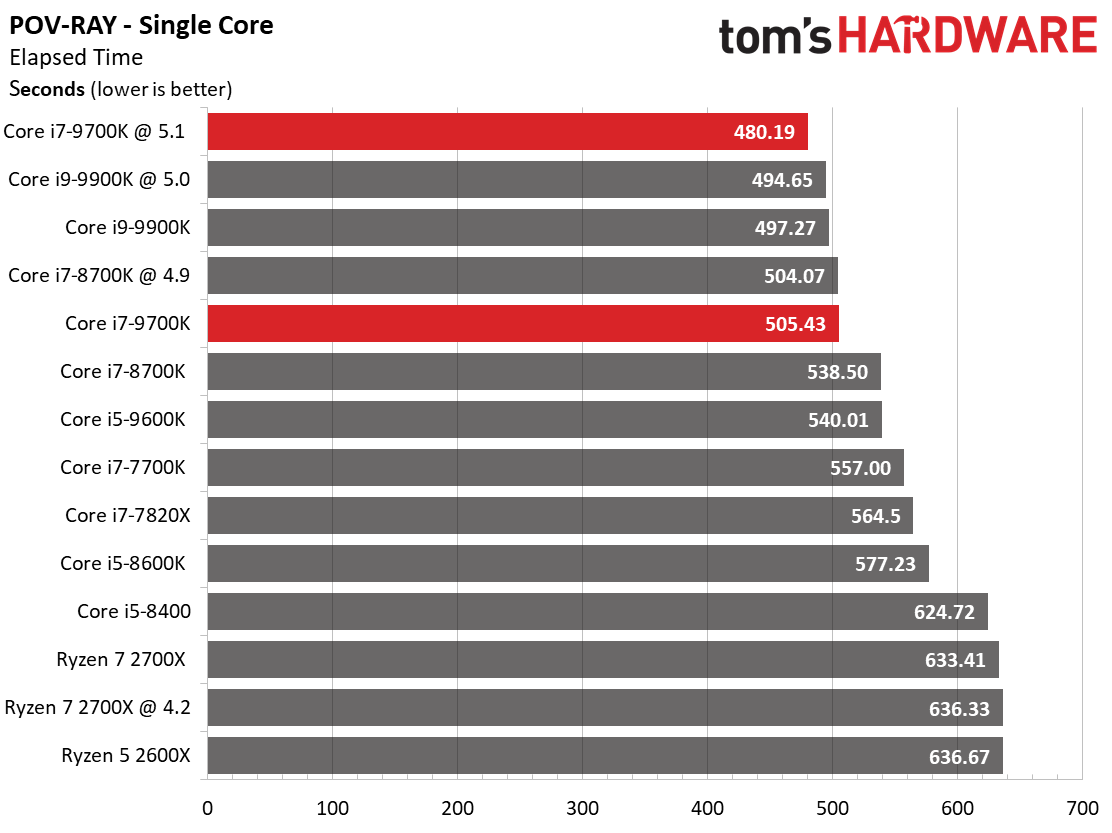
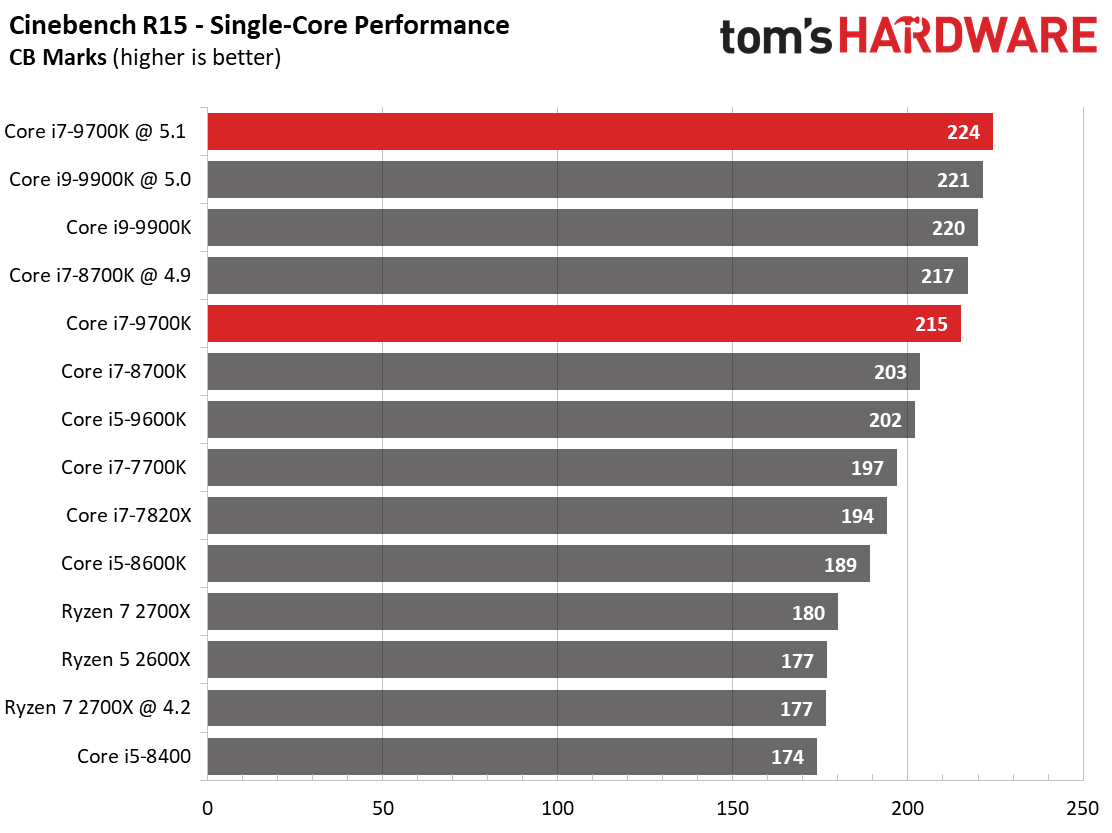
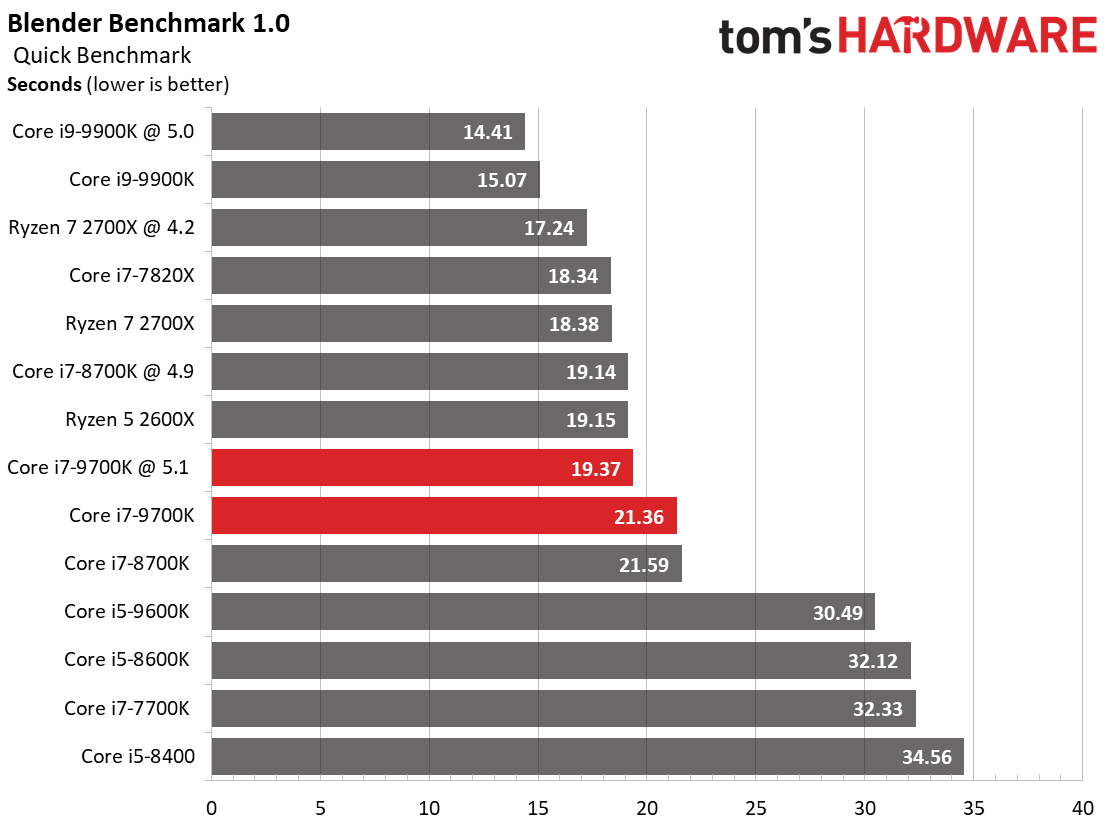
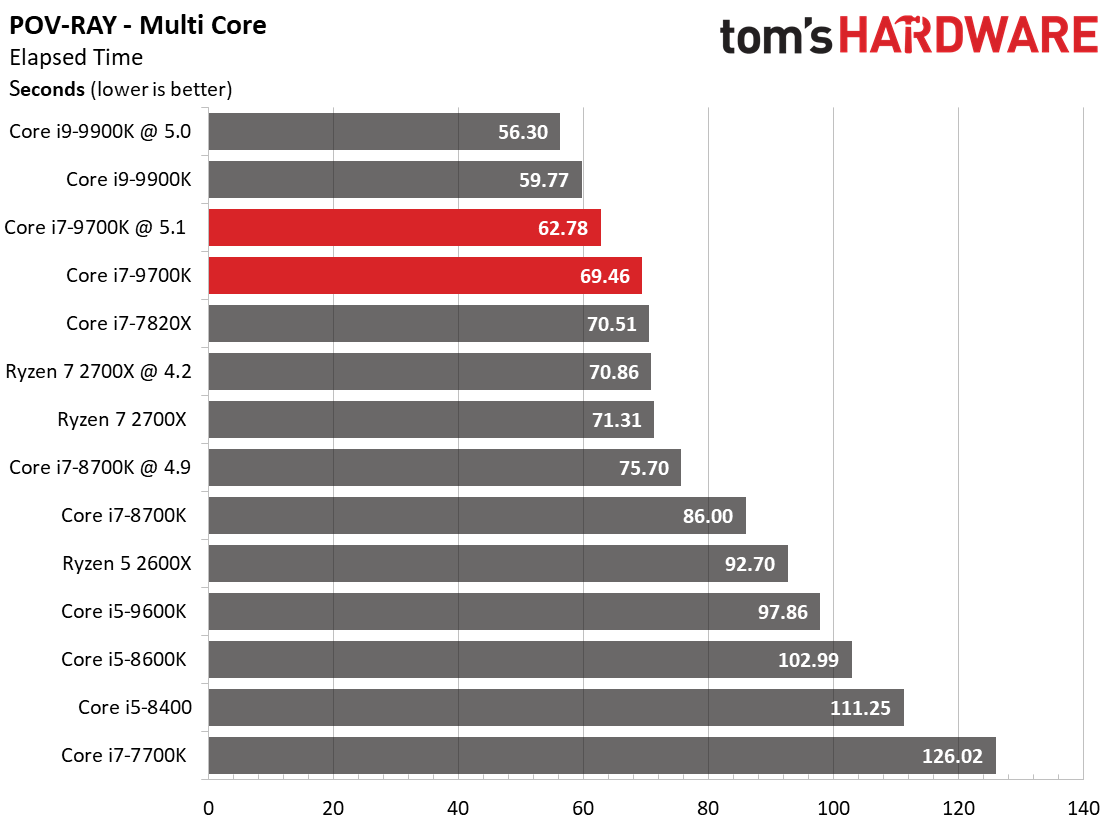
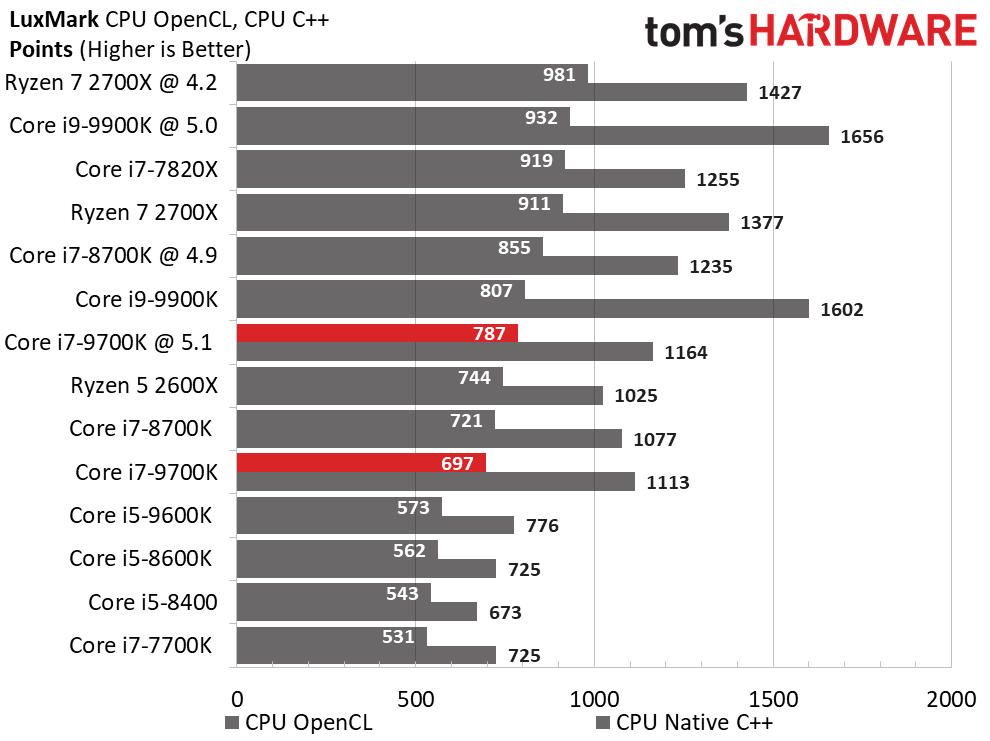
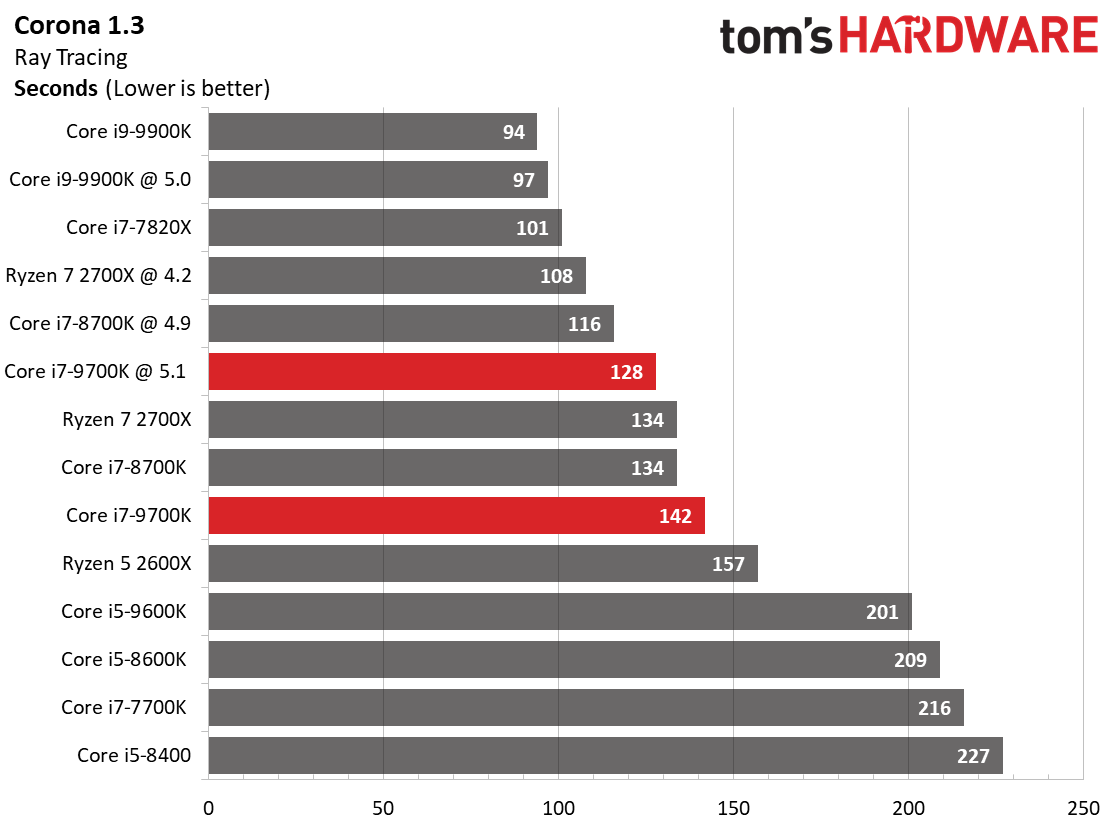
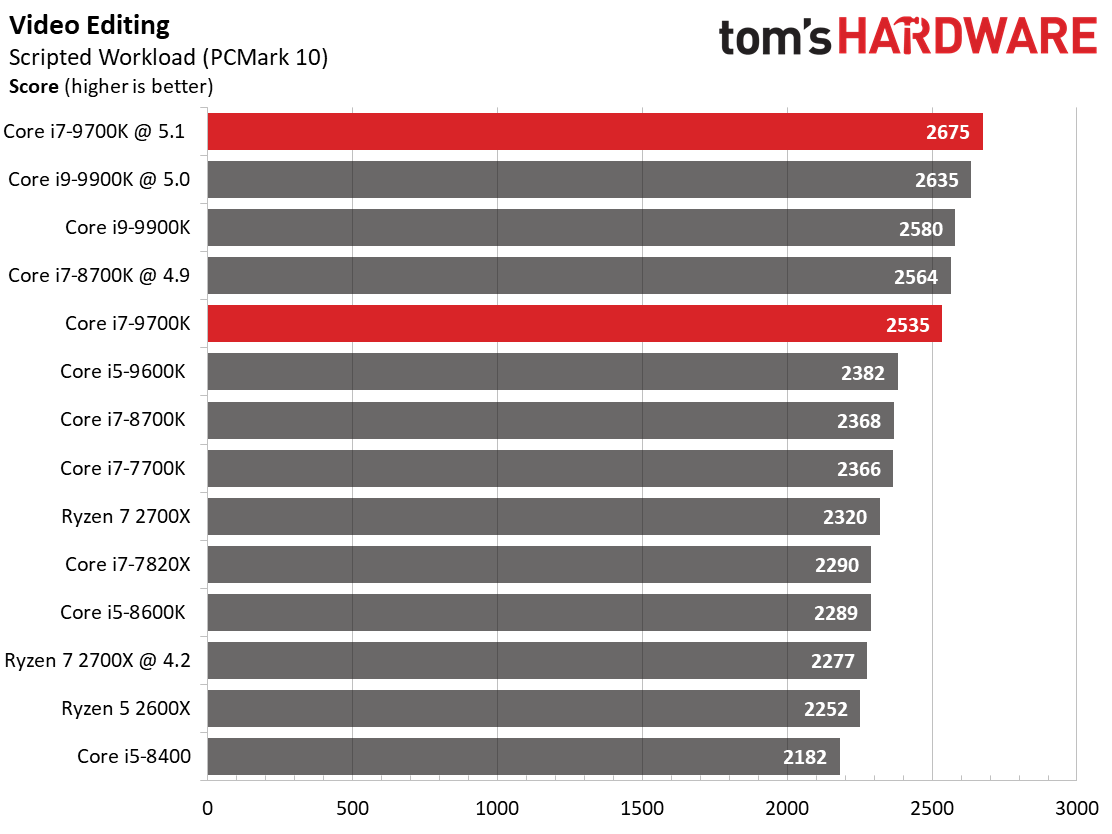
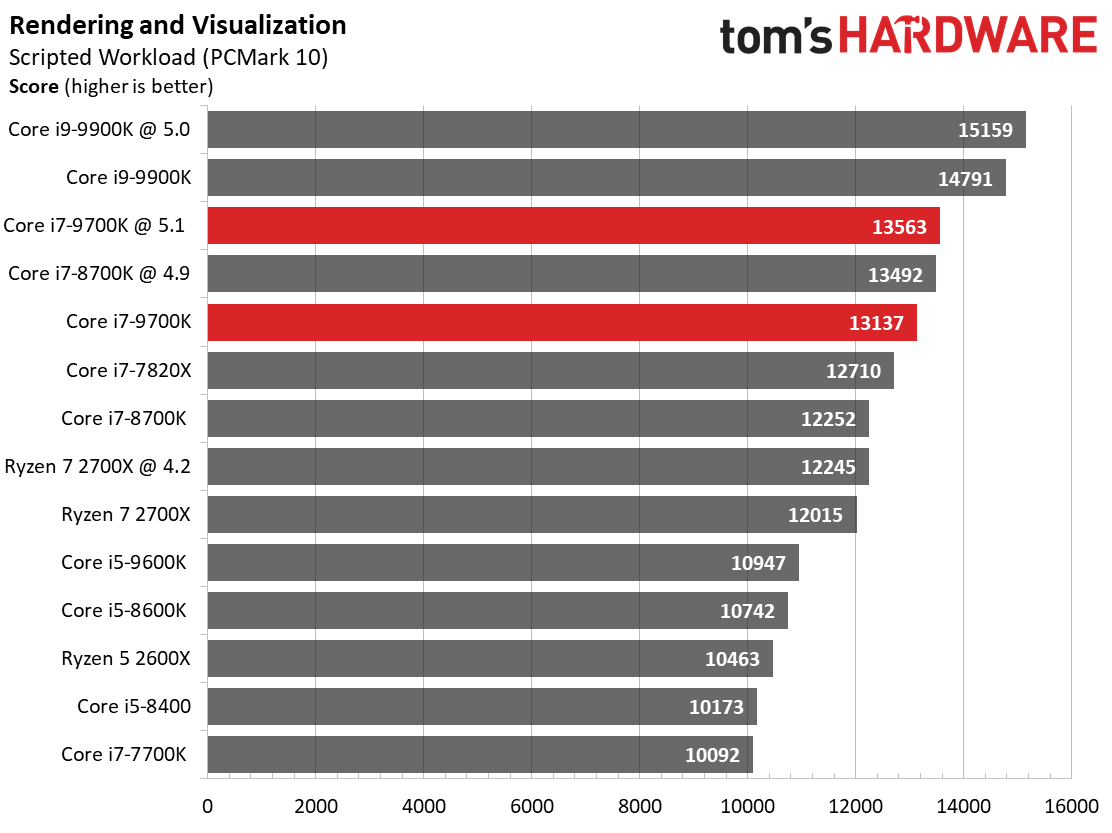
AMD's Ryzen 7 2700X shows the value of eight cores armed with simultaneous multi-threading technology through our parallelized rendering workloads. The Ryzen CPU comes out ahead in the Cinebench, LuxRender, and Blender benchmarks.
Meanwhile, Core i7-9700K trails AMD, but does offer a slight step up over the previous-gen -8700K in stock form. After overclocking, Core i7-8700K surprisingly beats the -9700K in our Corona and LuxRender tests.
Single-threaded workloads, rendering or otherwise, continue to be dominated by Intel's capable architectures.
Encoding & Compression
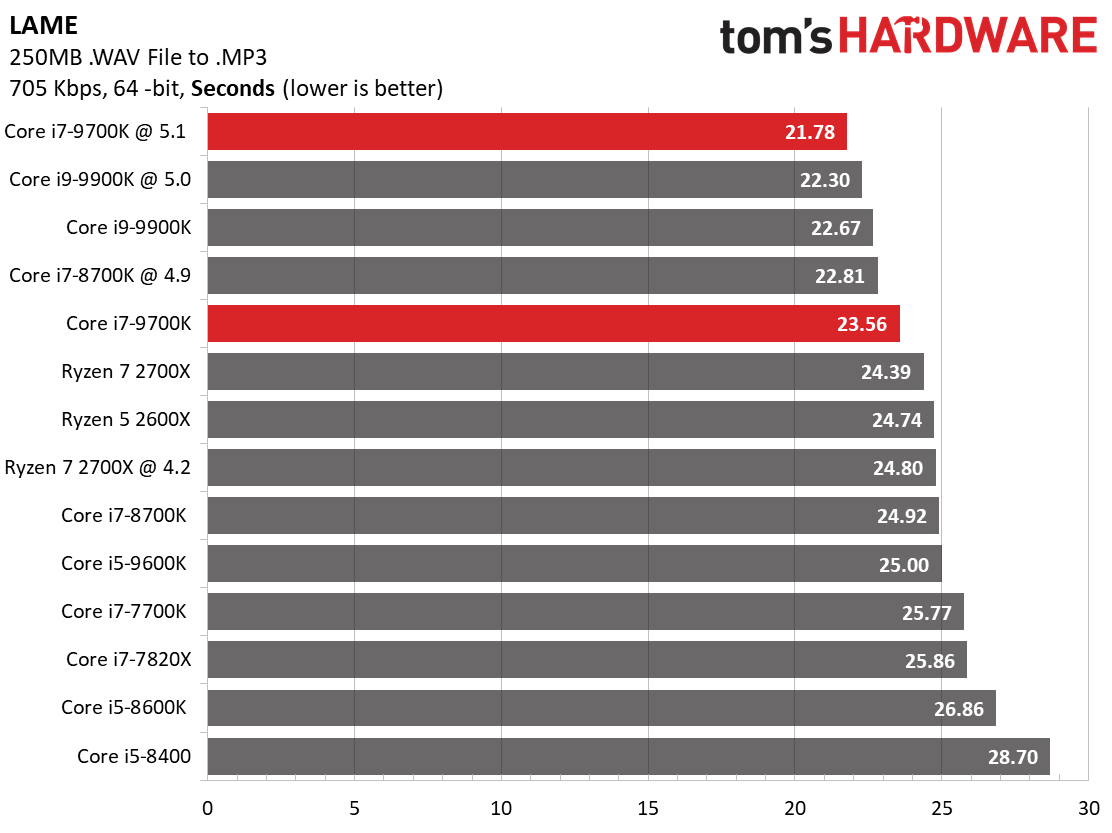
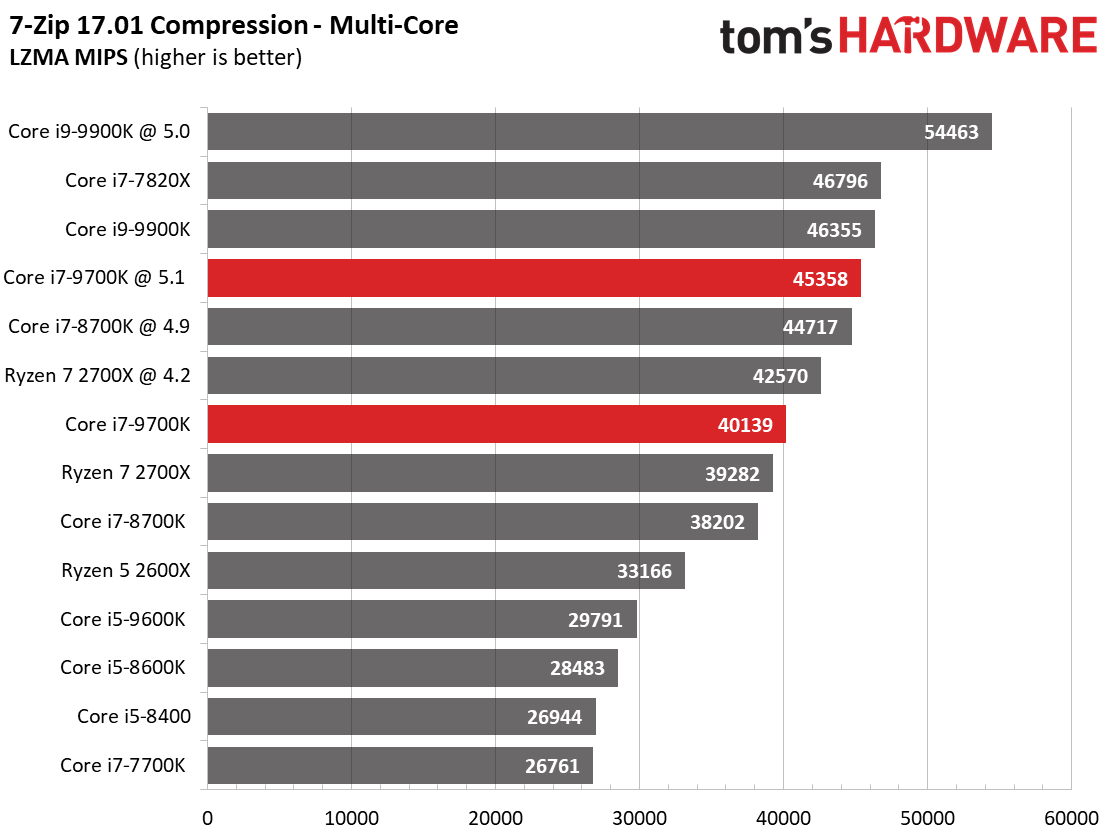
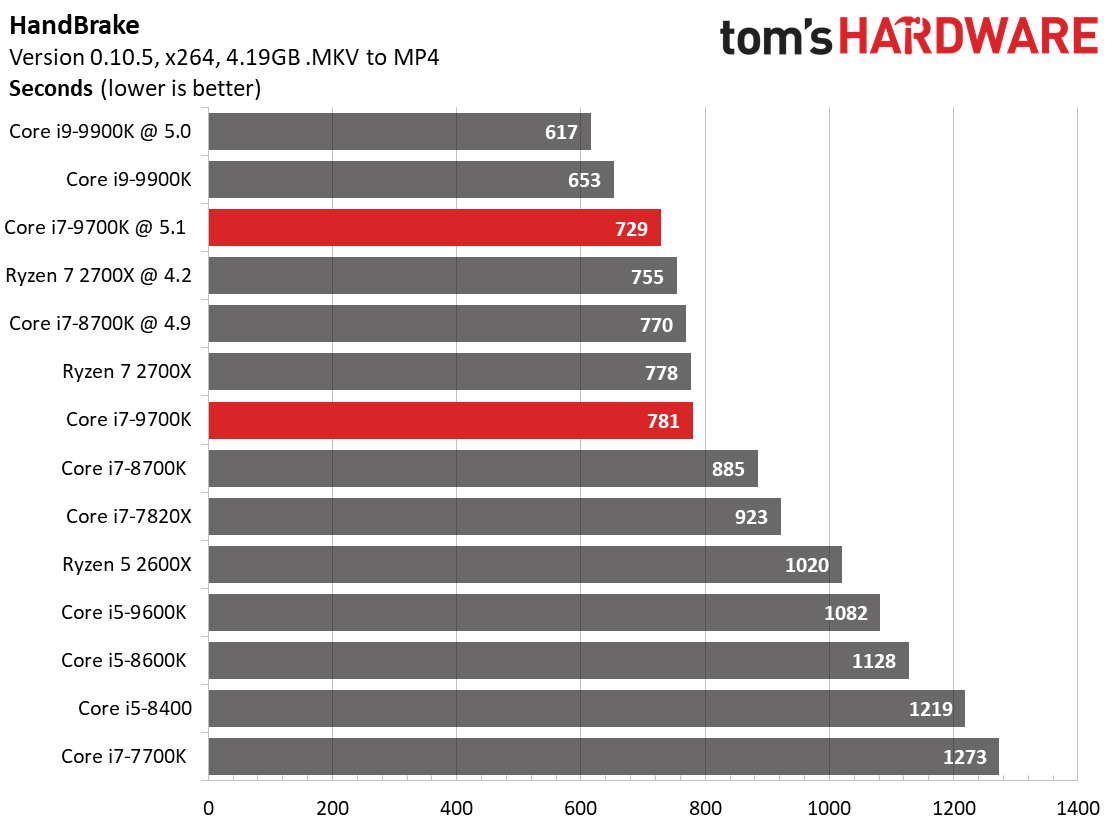
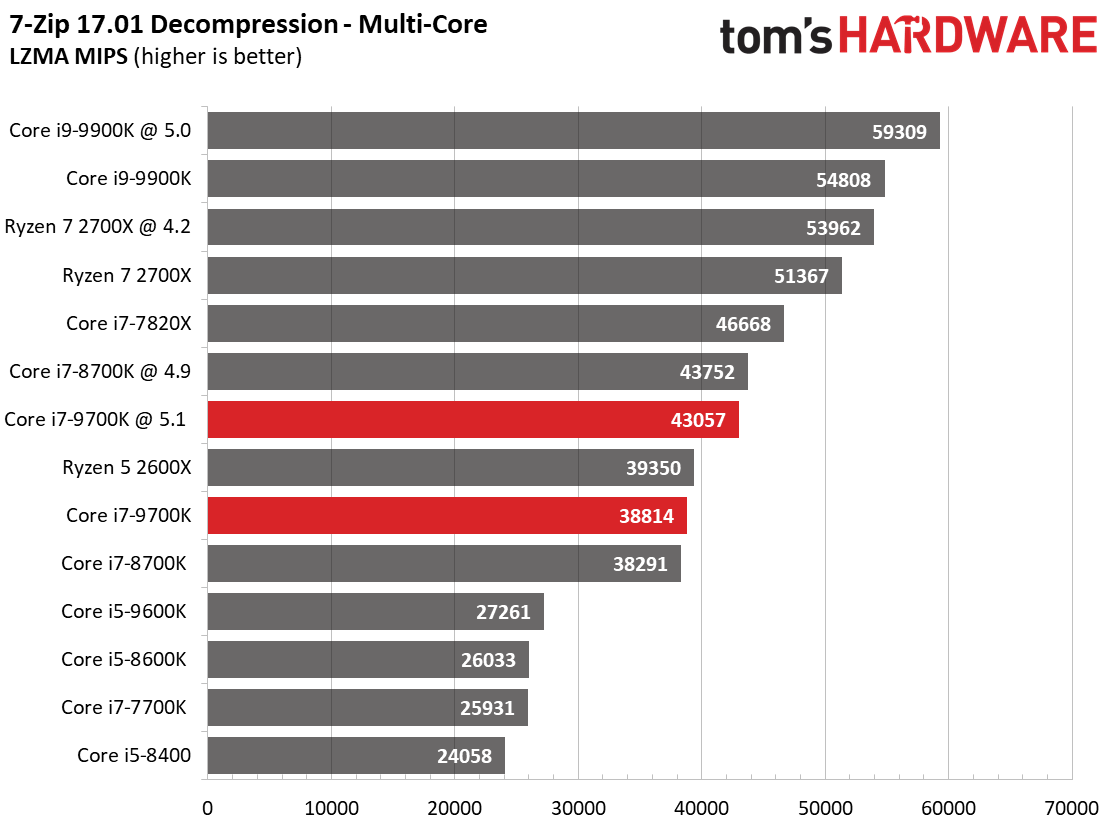
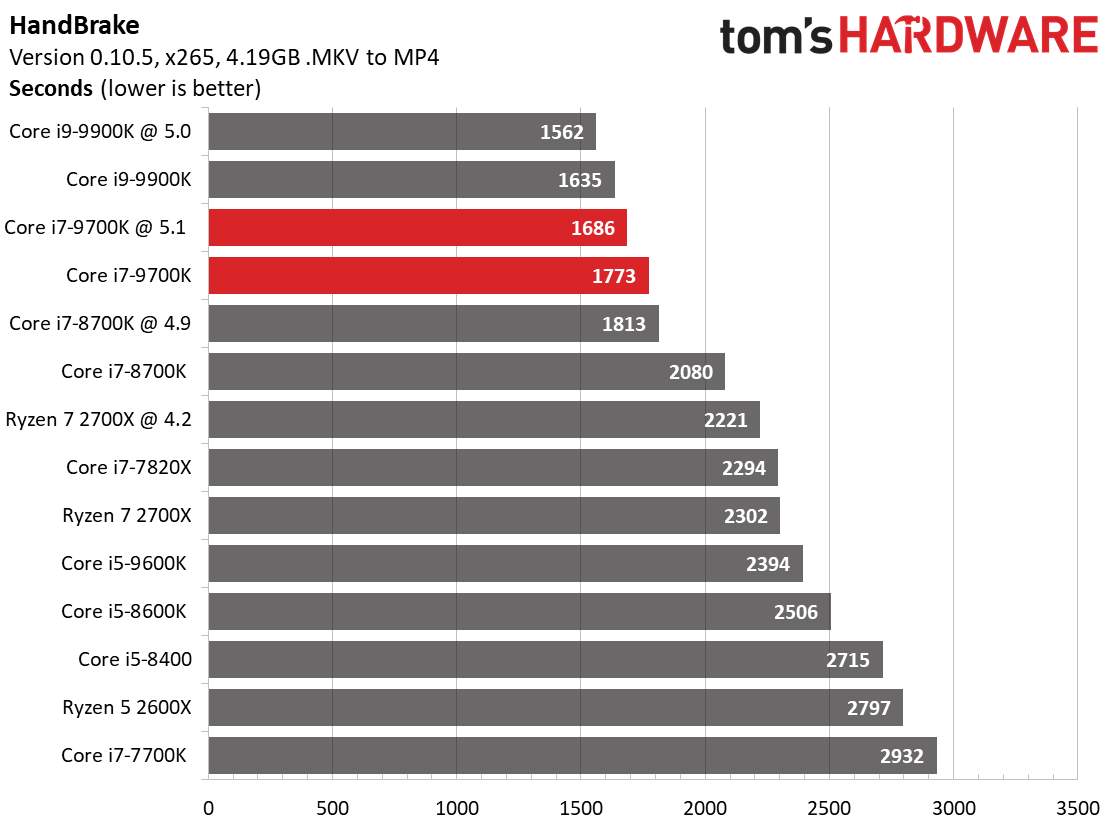
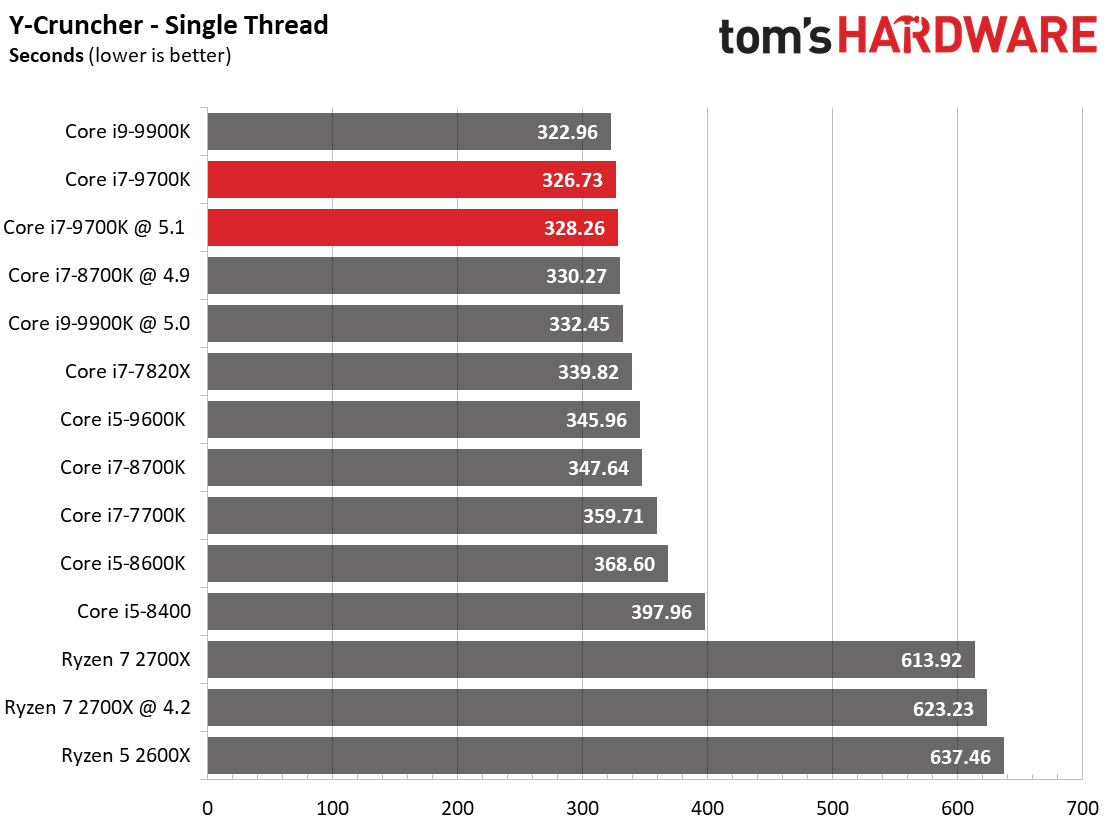
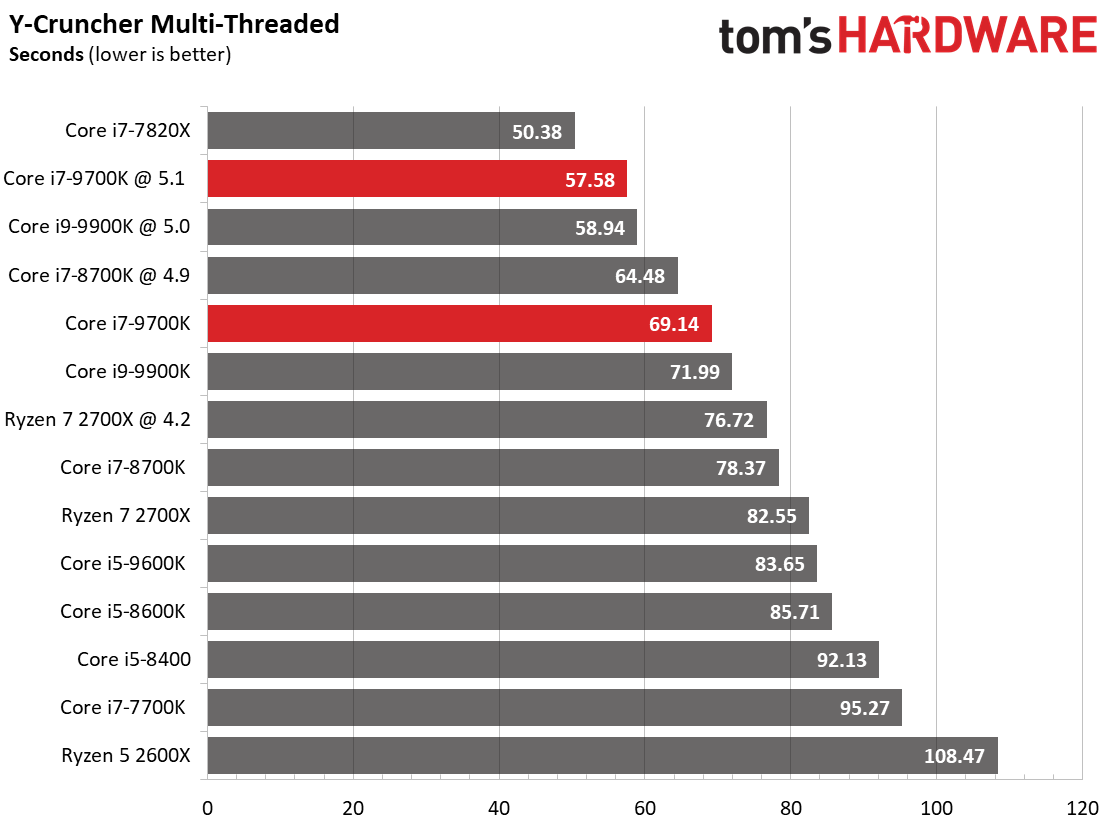
LAME is the quintessential example of a lightly-threaded workload. No surprise: an overclocked Core i7-9700K leads convincingly.
Our threaded compression and decompression metrics work directly from system memory, removing storage throughput from the equation. Ryzen 7 2700X is competitive in the compression test, but really shines through our decompression task.
y-cruncher, a single- and multi-threaded program that computes pi, is a great test for measuring the effect of AVX instructions. We dialed back the Core i7-9700K's all-core AVX frequency to 4.8 GHz after overclocking, so its single-core y-cruncher score at stock settings is faster than the tuned configuration. That's a result of the 4.9 GHz single-core Turbo Boost bin.
Core i7-9700K beats the Ryzen 7 2700X during our HandBrake x265 test, which relies heavily on AVX instructions. Meanwhile, the 2700X is more competitive in our H.264 benchmark. Notice that the tuned -9700K outpaces Intel's stock configuration, despite our 4.8 GHz AVX offset. That's because the stock setup drops to an all-core 4.6 GHz under full utilization.
Get Tom's Hardware's best news and in-depth reviews, straight to your inbox.
MORE: Best CPUs
MORE: Intel & AMD Processor Hierarchy
MORE: All CPUs Content
Current page: Rendering, Encoding and Compression
Prev Page Office and Productivity Next Page Conclusion
Paul Alcorn is the Editor-in-Chief for Tom's Hardware US. He also writes news and reviews on CPUs, storage, and enterprise hardware.
-
rantoc Considering the amonth of security flaws that have been found lately the lack of HT could become a blessing in the end!Reply -
logainofhades I would like to see a locked at same clocks review, for these CPU's. It seems you really have to push Intel, to handily surpass AMD. It reminds me of the FX vs Sandy bridge days.Reply -
ingtar33 Well I just went from an I5-4690K to an AMD Ryzen 7 2700 after seeing the price of intel's current lineup, and knowing that Ryzen2 is coming in another 6mo or so. Personally I thought it was a no brainer, since the 7 2700 could be had for $260, mine is in an mitx build right now with a little Kracken M22 cooling it, and as I type on it it's currently plugging along at 4.2 ghz with DDR4 3600 ram in it.Reply
What point am I making? Well, the motherboard, cpu cooler and cpu combined were cheaper then this i7 in this review. chew on that. And remember that ryzen2 should be out sometime in the spring of 2019, and it will be completely compatible with everything I just purchased while being on par with or even faster then this last intel chip.
Now that you've chewed on that for a bit, ask yourself "why did THG stamp an editor approval on this chip again?" We probably should, "Just buy it," I guess, and not ask so many questions. -
ingtar33 Reply21463450 said:I would like to see a locked at same clocks review, for these CPU's. It seems you really have to push Intel, to handily surpass AMD. It reminds me of the FX vs Sandy bridge days.
except that's not what we're seeing. 105.5 fps vs 94.9 fps is 10.4%, a 10.4% improvement for the 8c16t intel core i9-9900k. yet the chip is running at 5.0ghz vs the 8c16t ryzen 7 2700x at 4.2 ghz, which means the intel is clocked about 19.0% faster then the AMD to get a 10.4% lead in FPS.
These Intel cpus DO NOT have higher IPS then Ryzen. If anything, assuming there isn't some sort of scaling issue in the testing suite, this seems to indicate that intel's cpus have moderately less IPS then AMD Ryzen+ and are currently getting by with clock speed alone. Which means this is as far away from sandy bridge vs fx then we could get. Sandy bridge didn't just clock to 5ghz, but was sporting almost 40% better IPS then Piledriver FX cpus. -
InvalidError Reply
You are getting product and code names confused. Ryzen 2 (Zen+) has been out for over six months already and your new Ryzen 2700 is one of those. Ryzen 3 (Zen 2) is what's coming out in 2019 on 7nm.21463471 said:And remember that ryzen2 should be out sometime in the spring of 2019 -
adam.oakes83 INGTAR33, you can't just make up results and claim tReply
It to be proven actuate by doing a math equation. 99.99% of the internet making claims with no source to back it up. -
TerryLaze Reply21463503 said:except that's not what we're seeing. 105.5 fps vs 94.9 fps is 10.4%, a 10.4% improvement for the 8c16t intel core i9-9900k. yet the chip is running at 5.0ghz vs the 8c16t ryzen 7 2700x at 4.2 ghz, which means the intel is clocked about 19.0% faster then the AMD to get a 10.4% lead in FPS.
These Intel cpus DO NOT have higher IPS then Ryzen. If anything, assuming there isn't some sort of scaling issue in the testing suite, this seems to indicate that intel's cpus have moderately less IPS then AMD Ryzen+ and are currently getting by with clock speed alone. Which means this is as far away from sandy bridge vs fx then we could get. Sandy bridge didn't just clock to 5ghz, but was sporting almost 40% better IPS then Piledriver FX cpus.
This only works if you don't know CPU and GPU utilization.
Looking at a lot of gaming benchmarks even the i3/pentiums/2400g etc are only 10-20% below the 9900k because gaming benchmarks are made to push the GPUs and not the CPUs so the GPUs bottleneck way before the CPUs,and even if they don't, scaling in games means that slower CPUs can just use more threads to get to the same FPS.
Look at CPU benchmarks the deficit the ryzen CPUs have there is still there in gaming it just shows in the utilization where the ryzen cpu will have 30-40% more utilization (2700x vs 9900k) . -
Dantte PCgamers did some testing delidding a 9900K and determined that the solder TIM does NOT provide any additional cooling when compared to a 8700K because the die is much thicker (about 32% thicker) and hampers the transfer. Also the solder is too thick as well.Reply
They tested and proved this theory by delidding and replacing the solder with conductonaut and got a 8C decrease in temps. Then they lapped the die -.15 and -.20mm and retested which came back with even lower results. -
t99 Glad I went with a 2600 for only 150$ new and just OC if needed. Basically a 2600x and the avg is within 20% of an OC'd 9900k and 10% of 8600k.Reply
When you account for the difference in cooling and motherboards as well you can get a 2600 + 1070ti for price of a 9700k.
Maybe we will see larger gaps with the new intel when they test 1080p on a 2080. So glad I didnt wait and go with one of these